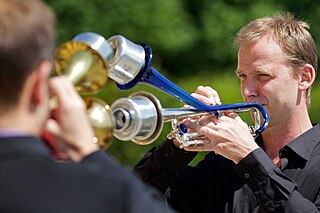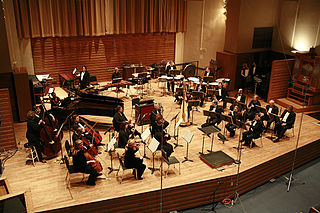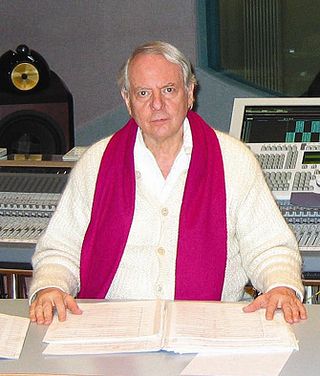
Johannes Georg Fritsch was a German composer.
Hanspeter Kyburz is a contemporary Swiss composer of classical music, known for applying electronic music techniques to his productions.
Carl Rosman is an Australian clarinettist, singer and conductor.
York Höller is a German composer and professor of composition at the Hochschule für Musik Köln.

Toshio Hosokawa is a Japanese composer of contemporary classical music. He studied in Germany but returned to Japan, finding a personal style inspired by classical Japanese music and culture. He has composed operas, the oratorio Voiceless Voice in Hiroshima, and instrumental music.
John McGuire is an American composer, pianist, organist, and music editor.

Marco Blaauw is a Dutch trumpet soloist known for his work in the field of new music and with Cologne-based contemporary music group Ensemble Musikfabrik. He plays a double bell trumpet, an invention that has allowed for numerous new compositions for trumpet, including those by Ernst von Siemens Music Prize winner, Rebecca Saunders. Blaauw is a consistent faculty member at the Darmstadt Summer Course, the Stockhausen Courses Kürten, the Lucerne Festival, and the Chosen Vale International Trumpet Seminar.
Clement Power is a British conductor.

The conductorless orchestra, sometimes referred to as a self-conducted orchestra or unconducted orchestra, is an instrumental ensemble that functions as an orchestra but is not led or directed by a conductor. Most conductorless orchestras are smaller in size, and generally perform chamber orchestra repertoire. Several conductorless orchestras are made up of only strings and focus primarily on string orchestra repertoire. Conductorless orchestras generally come from the classical music tradition and perform standard repertoire, but many conductorless orchestras promote or specialise in contemporary classical music repertoire. Many contemporary classical music ensembles also regularly perform without a conductor.
Carola Bauckholt is a German composer. She was born in Krefeld, West Germany. She worked at the Marienplatz Theater in Krefeld and studied music with Mauricio Kagel at the Cologne College of Music and Dance from 1978–84.

Sonntag aus Licht is an opera by Karlheinz Stockhausen in five scenes and a farewell, to a libretto written and compiled by the composer. It is the last-composed of seven operas that comprise the cycle Licht (Light). Its stage premiere in 2011 was posthumous, more than three years after the composer's death.
Simon Steen-Andersen is a Danish composer, performer, director and media artist.
Kumiko Omura is a Japanese composer in the field of contemporary instrumental and electronic music.

The Oeldorf Group was a musicians' collective active in Germany in the 1970s. Based in the village of Oeldorf, near Cologne, their performances emphasized live-electronic music.
Michael Ostrzyga is a German Composer and Conductor based in Cologne. He is known for his choral music in particular, being commissioned by festivals like the Schleswig-Holstein Musik Festival and performers like The Chamber Choir of Asia, the Finnish YL Male Voice Choir, the Vienna Chamber Choir, Latvian Youth Choir "Kamēr..." and Chamber Choir Consono, among others. His works are performed by ensembles like the Raschèr Saxophone Quartet, New Dublin Voices, the Australian Chamber Choir, Rheinisches Klavierduo, Swedish choirs Kammarkören Pro Musica and Allmänna Sången Neues Rheinisches Kammerorchester, The Choral Project (California) and SFA A Cappella Choir (Texas).

Johannes Kalitzke is a German composer and conductor. After studying in Cologne and at the IRCAM in Paris, he was chief conductor at the Musiktheater im Revier in Gelsenkirchen for several years, then led the ensemble musikFabrik and composed operas on commissions in Germany and Austria. He has been Professor of Conducting at the Salzburg Mozarteum from 2015.
Neue Musik is the collective term for a wealth of different currents in composed Western art music from around 1910 to the present. Its focus is on compositions of 20th century music. It is characterised in particular by – sometimes radical – expansions of tonal, harmonic, melodic and rhythmic means and forms. It is characterised by the search for new sounds, new forms or new combinations of old styles, which is partly a continuation of existing traditions, partly a deliberate break with tradition and appears either as progress or as renewal.

Raphaël Cendo is a French composer of contemporary classical music.
Konstantía Gourzí is a Greek composer and conductor. She is professor of ensemble conducting and new music at the University of Music and Performing Arts Munich.
Rolf Riehm is a German composer who wrote stage and orchestral works as well as music for ensembles and solo instruments. He began as an oboist and music teacher and was later a professor of music theory at the Hochschule für Musik und Darstellende Kunst Frankfurt am Main for several years.








